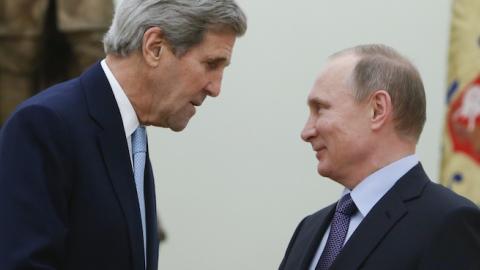In the space of just one year, the West has twice made Russian President Vladimir Putin an offer too good to refuse. Or so it thought. In February 2015, under the auspices of the OSCE, negotiators in Minsk overlooked Russia’s annexation of Crimea in order to reach a cease-fire agreement for the Donbas region of Ukraine. One year later, in February 2016, U.S. Secretary of State John Kerry sidestepped questions over Bashar al-Assad’s future in return for a cessation of hostilities deal for Aleppo. In effect, the United States and its allies offered Putin Crimea and a rump Syria in return for peace. Sensing weakness, the Russian president pocketed both offers and promptly violated the agreements, most egregiously in Syria.
Over the past year, Putin has focused on re-imposing Assad’s control over so-called vital Syria, stretching from Damascus to Aleppo. In the process, he has transformed the strategic landscape of the Middle East for the worse. In Latakia, Putin has established bases that include game-changing strategic weapons. In close coordination with Iran and Hezbollah, Russia has secured the Damascus to Latakia corridor, including from Homs up to the north Hama plains, and squeezed the opposition around Damascus. Now, the alliance is besieging Aleppo, Syria’s largest city, under the motto: surrender or starve.
Spurned, the Obama administration is hoping that Russia will fail in its attempt to decide the war by force — pushing Putin back onto the diplomatic track. As Deputy Secretary of State Tony Blinken explained over a week ago after the collapse of the latest agreement, “The leverage is the consequences for Russia of being stuck in a quagmire that is going to have a number of profoundly negative effects.” Unfortunately, there is little evidence to suggest that Russia is being bogged down by its involvement in Syria. In fact, through only an expeditionary force, Russia has driven the Sunni rebel opposition from the coast and surrounded eastern Aleppo. If Aleppo falls, the regime may very well attempt to push the rebels into manageable pockets in the countryside, leaving them to wither away and die.
Reportedly, President Barack Obama may convene an NSC meeting in the coming days to discuss Syria now that Secretary Kerry has pronounced the latest agreement with Russia a dead-end. Ordinarily, this might constitute a crucial inflection point — the beginning of a last dash effort to stave off the fall of Aleppo. For that to occur, however, the president will need to gain newfound appreciation for a key lesson of the past decade — that Sunni extremism thrives in the shadow of Shia sectarianism.
As Russia, Iran, and Assad besiege the rebel opposition in the north and drop bunker bombs on Aleppo, Sunnis are turning to Islamists as the only viable anti-Assad force. If the United States is to extinguish the Islamic State (IS) — not just the group, but any successor organization as well — it cannot simply conduct counterterrorism operations around Mosul and ignore the contest for regional power unfolding in Aleppo.
For far too long, the United States has focused on combatting IS in the eastern Syrian steppe, from the Turkish border to Raqqa, while only meekly supporting the moderate rebels fighting Assad in Homs, Idlib, and Aleppo. Unless the United States helps shape a new regional order that empowers these moderate Sunni Arabs against Shia domination, we are condemned to a perpetual game of terrorist whack-a-mole across the region.
It is not too late. In a sense, Russia’s most recent refusal to work with the United States speaks to the enduring strength of the moderate rebels. There is an enormous reservoir of Sunni manpower in the northern countryside—the closer to the Turkish border, the stronger. If all that remained in these areas was Jabhat al-Nusra or the Islamic State, Russia might be less inclined to snub the United States. But so long as an acceptable moderate alternative to Assad exists, Russia will seek to bomb the opposition into submission.
Luckily for us, the key actor in northern Syria is a NATO ally, Turkey. Since August, Ankara has intervened in northern Syria to forestall a Syrian Kurdish breakout—an impressive feat coming little over a month after the failed coup attempt against Turkish President Recep Tayyip Erdogan.
The Obama administration should aggressively back Turkey’s support of the Free Syrian Army in the Aleppo countryside. At the same time, it should seize on the recent formation of the Free Idlib Army as a rare chance to support moderate opposition elements in a province rife with extremists. If properly resourced, the Free Idlib Army might even project power into neighboring Aleppo, Latakia, and Hama provinces. Moreover, it can draw off regime troops from the siege of Aleppo, as hardliners have already done in the north Hama countryside.
As far back as February, Secretary Kerry was criticizing the Russian air campaign and Assad. “This has to stop. Nobody has any question about that,” the secretary of state solemnly intoned. “But it’s not going to stop just by whining about it.” In May, he escalated the point by warning, “So either something happens in these next few months, or they are asking for a very different track.” Privately, Secretary Kerry now laments that he “lost the argument. I’ve argued for the use of force.”
If the president is rejecting Kerry’s counsel, the secretary of state should resign. Assad now ranks as perhaps the worst killer since Pol Pot brutalized Cambodia in the 1970s while Putin has revealed himself as an insatiable revisionist intent on exploiting American weakness. Far better for Kerry to exit the stage in a burst of honor than vainly travel the world like a modern-day Falstaff perpetually humiliated by Putin. It is past time for the U.S to end the diplomatic track and impose meaningful costs on Russia, Iran, and Assad. The future of the region and the defeat of the Islamic State depend on it.

















